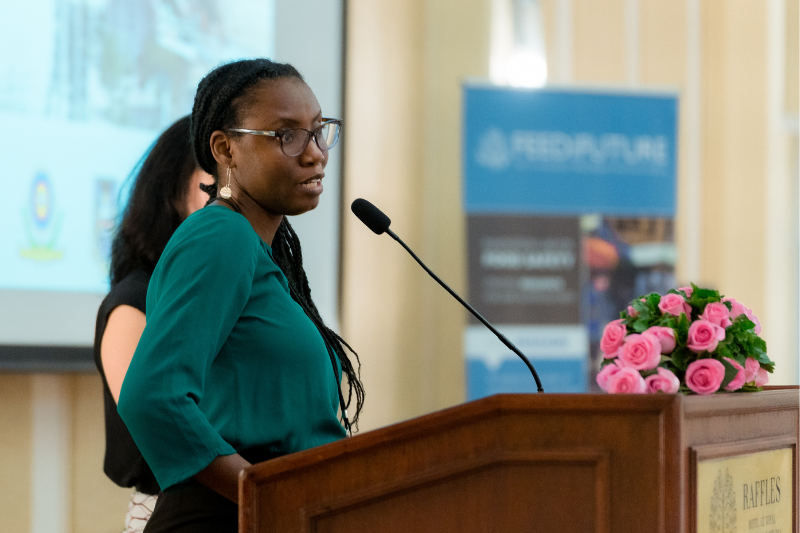
Growing up in Nigeria with an aptitude for math and science, Abiodun Atoloye aspired to become a pharmacist or chemical engineer. However, a nutrition course during her third year at Nigeria’s Obafemi Awolowo University changed everything.
“I became fascinated with food, diet, and their effects on health,” says Atoloye, now an assistant professor of nutrition in the Department of Nutrition, Dietetics, and Food Sciences (NDFS) at Utah State University. “Moreover, I became more aware of global health issues, such as malnutrition, obesity, and chronic diseases, and I wanted to contribute solutions through public health initiatives.”
Since learning the foundations of community-based participatory research (CBPR) while pursuing a master’s degree in Human Nutrition at the University of Ibadan, Atoloye has developed a nutrition research program that tests and develops community-adapted solutions to the challenges of food insecurity and malnutrition.
Atoloye leads the Equity in Food Access Research (E-FAR) Lab, which focuses on inequities in food access and community food systems. Using a CBPR approach, Atoloye seeks to understand the barriers that low-resource families, refugees, and immigrants face in accessing food that is healthy, affordable, safe, nutritious, and culturally acceptable. CBPR’s equity-driven approach involves community members, scientists, and other stakeholders in research, recognizing that each brings unique strengths and essential perspectives.
One recent study examined factors that influence the use of different community food resources among adults in the United States. Significant factors cut across family composition, racial and ethnic diversity, transportation access, and improved store offerings. Another study found that a nutrition education program, created for Supplemental Nutrition Assistance Program (SNAP)-eligible participants and then culturally adapted for Somali refugees in Utah, effectively improved nutrition-related behaviors in Somali refugee women.
Atoloye also tackles food safety through an equity lens. She is currently working on a project funded by the Feed the Future Innovation Lab for Food Safety to mitigate and prevent household foodborne illnesses in Nigeria. Household-level food safety is a significant economic and public health concern in her home country, which has a childhood stunting rate of 33 percent.
The Safe Food Matters Project seeks to identify the most common food safety risks in households, the prevalence of stunting in children under five years old, household practices that impact food safety, and challenges faced by mothers in providing safe and nutritious foods for their children. The study is co-led by Andrea Bersamin, professor at the University of Alaska Fairbanks, and Bolanle Otegbayo, professor at Bowen University.
“We observed a gap in knowledge on food safety issues, particularly within the household, which is connected to nutrition and health outcomes among young children,” Atoloye says. “Our research seeks to fill these knowledge gaps by investigating multi-level factors that cut across the individual level, infrastructure, and environment.”
By leveraging CBPR methods, Atoloye and her colleagues aim to better understand what specific characteristics make some households more vulnerable to challenges in maintaining good food safety. In addition, they are charting a path forward, with input from families, policymakers, public health practitioners, and other community stakeholders.
A new project, supported by the Feed the Future Innovation Lab for Horticulture, will work within five states in southwest Nigeria to train youth on climate-smart approaches to producing year-round African indigenous fruits and vegetables. The hope is that such a program will increase the production and subsequent consumption of indigenous produce, as well as provide employment opportunities.
“My part in the project will be to assess the impact of gardening training programs in secondary schools to improve diet diversity and nutrition outcomes among youths and their families,” she says.
In the future, Atoloye wants to continue her work on food safety challenges in Nigeria, particularly those faced by caregivers and mothers, a population she feels has received too little attention up to this point. Another looming issue is climate change, which could lead to an increase in the incidence of foodborne illnesses.
“My dream would be to see the positive effects of my research on the adverse outcomes that we’ve been observing,” she says. “I know I might not be able to see the effect now, but down the line, I hope that there will be a tangible, beneficial impact of my research.”
Meeri Kim is a freelance writer with the Feed the Future Innovation Lab for Food Safety. The Innovation Lab is one of a network of 20 such labs led by U.S. universities under Feed the Future, the U.S. government’s global hunger and food security initiative led by USAID.

